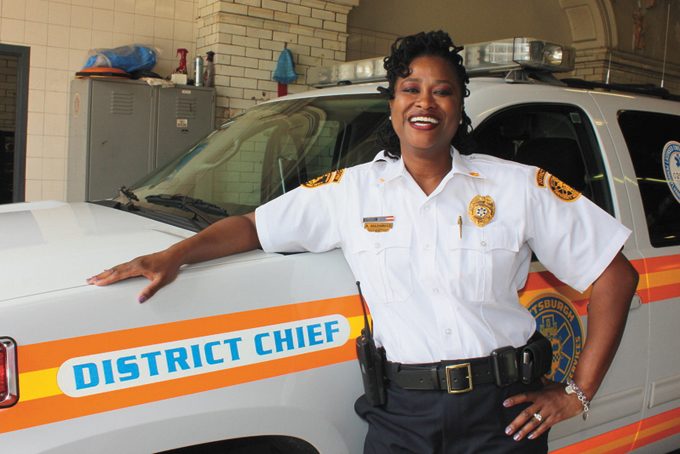
AMERA GILCHRIST
One day after putting in eight hours at PNC Bank, single mother Amera Gilchrist was riding the bus with her special needs son when he began choking on a piece of candy.
“I felt totally helpless, I didn’t know what to do. Luckily, when slipped down, he bumped his head and the candy popped loose,” she said. “But I decided right then, I was never going to be that helpless again.”
A friend of hers was studying to be an emergency medical technician at the time, so Gilchrist read all the books, signed up, completed the course and immediately went to paramedic school, all while still working at the bank and raising her son. She was hired by Pittsburgh as an EMT and now, 14 years later she is the first African-American woman to reach the rank of district chief.
She’d hoped to earn a management spot one day, but said it came as a complete surprise when acting Chief Mark Bocian went to her station to personally give her the news last week.
“My partner and I were kicking back on break, watching TV and he comes in and asks to speak with me privately,” she said. “He told me I was the best person for the job. I started crying, I was so happy. I had this huge wad of tissues. You’d have thought I won the Publisher’s Clearing House. It wasn’t pretty.
“Later, I realized I hadn’t heard a word he said after ‘district chief.’ I had to call him up a few hours later and ask him questions about the job. I’m really excited about this.”
Bocian said she’s earned it.
“She’s heavily involved in our Community Outreach Program and Education, talking to seniors and schools and recruiting, and she always presents herself and the bureau well,” he said. “She’s passionate, articulate and takes what we do to the community. More than that, she a good paramedic, and I expect her to be a good leader of paramedics.”
Gilchrist is now in training at the EMS station in Shadyside, and said the toughest thing to learn is scheduling. There are two district chiefs on duty at any one time, one supervising crew inside the rivers, and one outside. And though there will be times when she has to go out into the field on calls, it won’t be as demanding as working her way through the ranks.
“This is a job you have to want to do, to help people, and to be in situations that a normal person wouldn’t even imagine,” she said. “It’s physically and emotionally taxing. Patients aren’t getting any lighter. You find yourself with an obese patient in distress, up three flights, in July with no AC.”
Theoretically, she said, he new schedule will let he spend more time with her husband of seven years—a city firefighter, their 2- and 5-year-old daughters and her son, now 18. And while she said her schedule as a crew chief was exhausting, the hardest calls she went on were among her first, seeing young people dead.
“When I started, seeing all the young people shot out in Homewood, that was tough,” she said. “The worst is hearing the cry of a mother who’s lost a child. It’s heartbreaking. As long as I do this job, nothing comes close.”
Sometimes though, the job can be amusing—like helping, and following home, a one-legged man who’d tipped over on his scooter because he was intoxicated. The job can also be rewarding.
“The best call I ever had was for a special-needs child who was choking on a piece of steak. There was no air movement. I reached down there with (long specialized forceps) and pulled it out,” she said. “The sound of that air rushing in was one of the best feelings I ever had because I could actually see I made a difference.”
(Send comments to cmorrow@newpittsburghcourier.com)